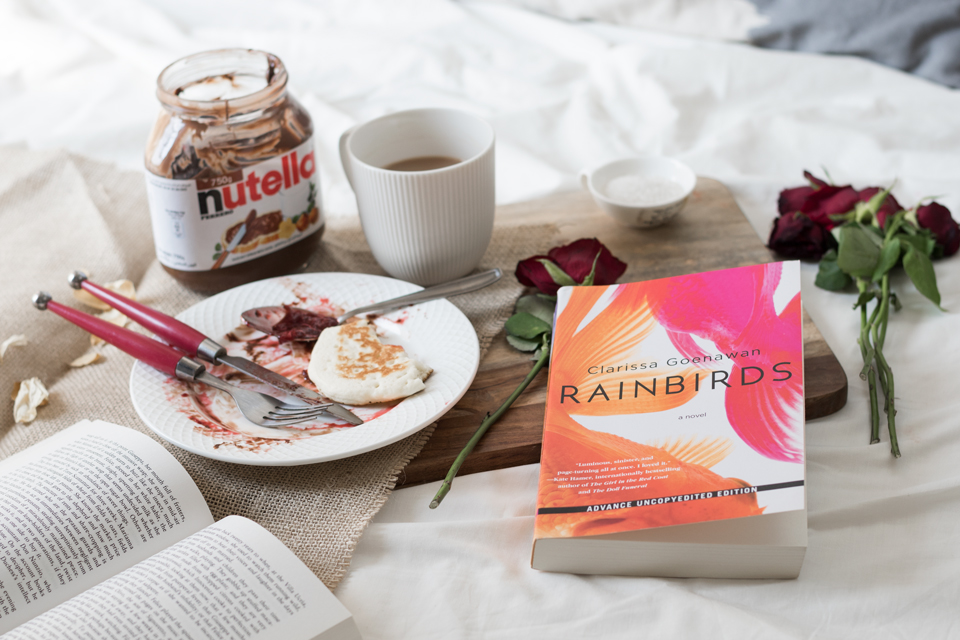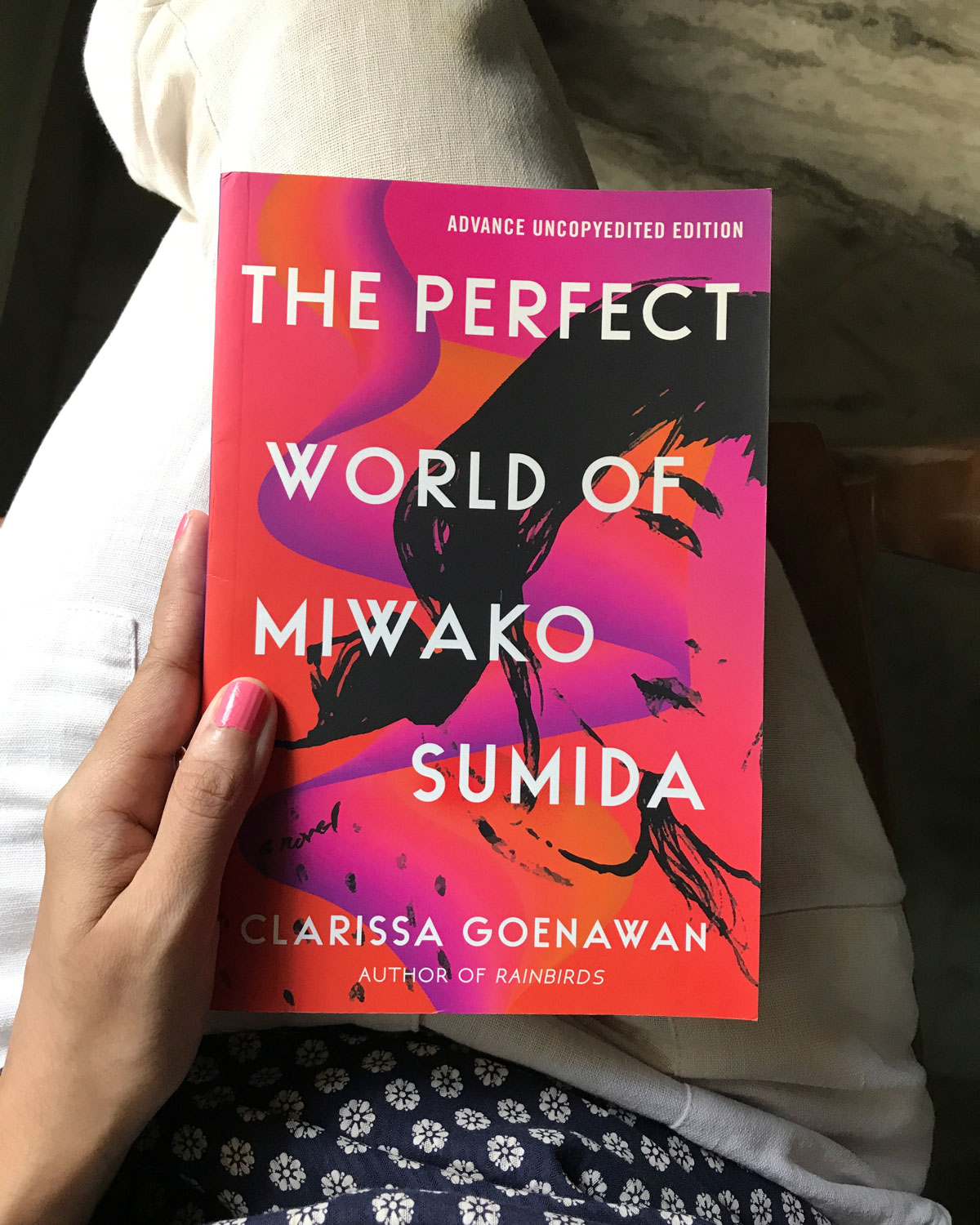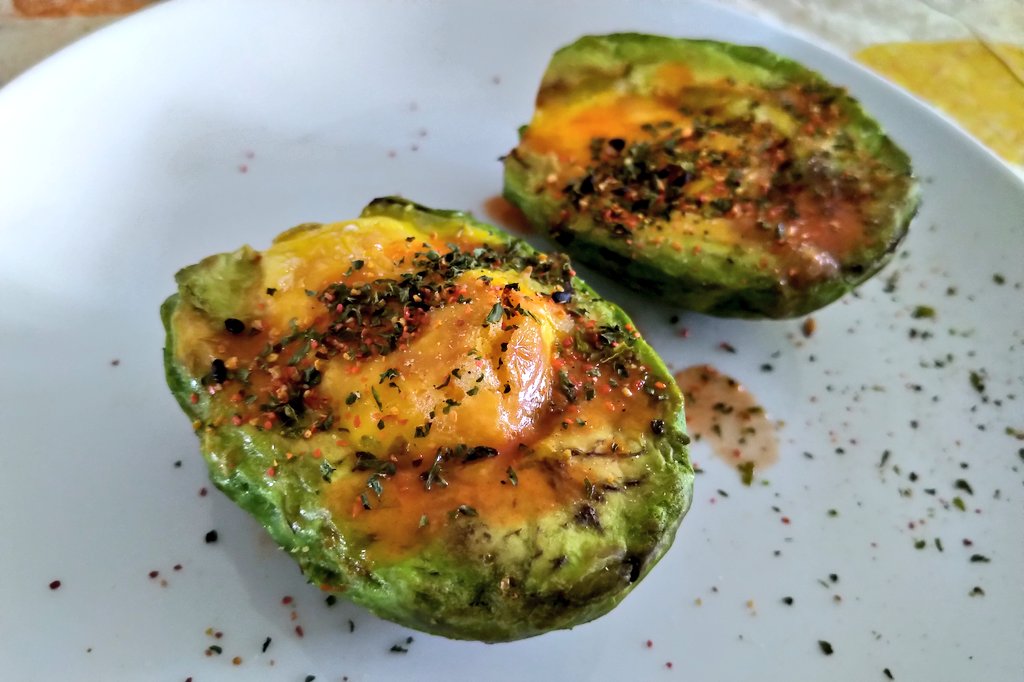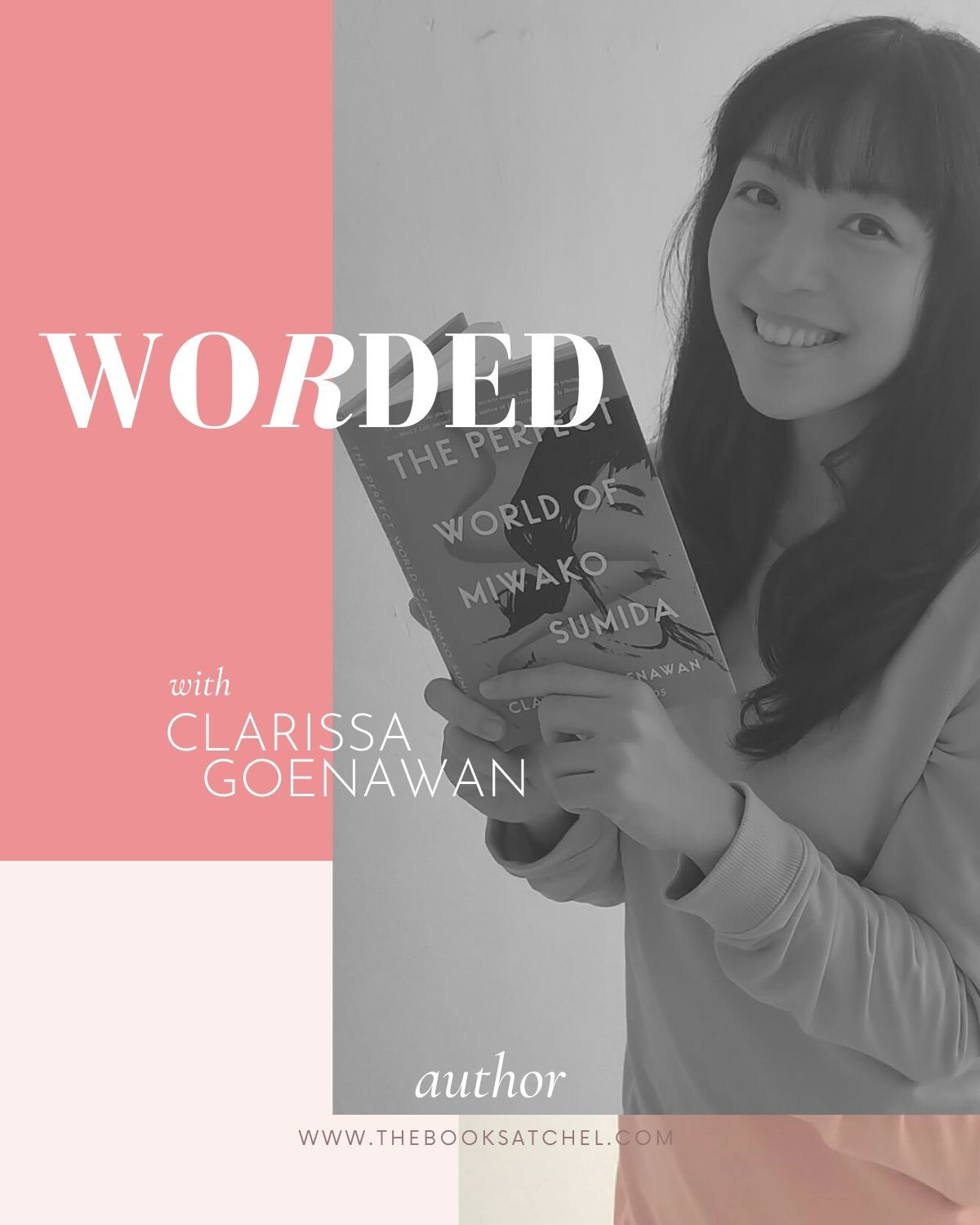Reader. Dreamer. Writer.
Clarissa Goenawan’s books are quiet, melancholic and explore grief, loneliness and friendship. Born in Indonesia, she calls herself a Singaporean writer. Her debut Rainbirds explored guilt and loneliness in the aftermath of the death of a loved one. It won the 2015 Bath Novel Award and has been shortlisted for the 2015 Dundee International Book Prize (UK), the 2015 SFWP Literary Award (US), and the 2016 First Novel Prize (UK). Her second novel, The Perfect World of Miwako Sumida, is set in the same universe as her debut novel. Here the minor characters from Rainbirds get more prominent roles. Goenawan is working on more literary mysteries set in the same world, giving voice to more minor characters. She has also written many short stories in various publications. In my interview with Clarissa Goenawan—who was super patient with the delays involved backstage—I learn about her ‘write eveywhere, write everyday’ routine, her Japanese language club at school and avocado eggs.
Interview with Clarissa Goenawan
I was thrilled to have Clarissa Goenawan as the first guest on the Worded—a series of long winded interviews exploring creativity, books and life. Edited excerpts from the interview follow:
Both your novels, Rainbirds and The Perfect World of Miwako Sumida, began as Nanowrimo projects. Do you find it easy to write through such challenges with set deadlines?
I always wanted to write a novel, so when I first heard of NaNoWriMo, my first thought was, “Why not?” Rather than a set deadline, what appeals to me most is the idea of writing the first draft fast to keep the momentum. I’m the type of writer who discovers my characters—and therefore the story—as I write them. I also love the sense of camaraderie from the NaNoWriMo community.
Your writing style has been compared with Murakami by many reviewers (including me). Does this annoy you?
On the contrary, I’m extremely flattered! But also, I feel an incredible amount of pressure. Haruki Murakami is one of the biggest contemporary authors right now. I really enjoyed some of his works, such as The Wind-up Bird Chronicle.
If you ask me, I do think that there are similarities in terms of genre and setting. So readers who love Murakami’s works will probably enjoy Rainbirds and The Perfect World of Miwako Sumida too. That being said, if someone is expecting another Murakami book, they might end up being disappointed.
Also Read : The Wind up Bird Chronicle is my favourite Murakami novel
Both your book releases have been through choppy weather because of personal tragedies and the pandemic. How did you push yourself as a new novelist during unfavourable circumstances?
It’s very easy to get discouraged, but I always remind myself that I’m in this for the long-term. Thankfully, the reading community has been very supportive. Many writers and book reviewers, such as yourself, offered to help get the word out, and I’m so, so grateful.
Are you a plotter or pantster? Did you decide early into the manuscript that minor characters in Rainbirds would find space to tell their stories in The Perfect World of Miwako Sumida?
I don’t plot. I usually have a clear idea of a beginning, a sense of ending, and some sort of key scenes I’d like to include—but nothing in-between. I just write whatever comes into mind, hoping that eventually, it’ll turn into something. I’m a believer in trusting your characters and letting them lead you to unexpected places.
While writing Rainbirds, I realised there was so much more about the side characters that I wanted to tell the readers, but the story has no space for their stories. Because of that, I decided to take these characters out, and give them the center stage in my next books.
I forgot where I heard this, but there was a saying that all side characters are the main characters in their own books.

You’ve been very lucky to have amazing cover designs for both your novels. The new Indonesian editions are too pretty! Were you involved in the design process?
Yes, I really love my covers too! The newly launched Indonesian editions are designed by Bali-based Sukutangan, a husband-and-wife-team.
I’ve been fortunate to be able to work with various publishers from around the world. When it comes to designing the book cover, each of them has their preferred workflow. Some publishers would send me a detailed questionnaire, asking for specific questions on my preferences. Others gave me a few options and let me chose my favourite. Some went straight to share the finalized covers. Regardless of the process, I trust my publishers and their expertise.
Grief has been a recurring theme in your books. How difficult is it to craft this emotion on the page especially when pertaining to death and suicide?
Using grief as a theme wasn’t a deliberate decision, but rather what came out subconsciously as I wrote the stories. If I were asked to specifically write about a certain emotion, it could be challenging. But because the emotion simply surfaced from the characters as I fleshed them out, they became a natural part of the process.
Can you tell me more about being in a Japanese language club in high school and becoming a manga aficionado? Did you imagine you’ll be writing books set in Japan one day?
I grew up when anime, manga, and other Japanese pop culture gained popularity. My interest started when I watched Sailor Moon on the local TV station. In school, I often borrowed comics from classmates. Aoyama Gosho’s Detective Conan series was very popular.
My first after-school activity was the Mathematics Club. Unfortunately, the club was disbanded during my second year because we didn’t meet the minimum member requirement. Because I love Japanese comics, I decided to join the Japanese Language Club. Apart from learning the language, the club also hosted cultural activities such as karaoke, origami, and other interesting stuff.
At one point in time, I hoped to become a manga writer. I collaborated with friends who were good at drawing. A couple of our collaborative works were even published in school magazines and indie zines. But to think that one day I would write books set in Japan? No, that had never crossed my mind.
My favorite manga is Death Note, written by Tsugumi Ohba and illustrated by Takeshi Obata. It follows a high school student who discovers a supernatural notebook that grants its user the ability to kill. The series has an interesting premise, but what piques me the most are the main characters. Death Note blurs the line between what is a protagonist and an antagonist.
The same writer-artist team also created Bakuman, another series I greatly enjoyed. In Bakuman, two young boys work hard together to achieve their dream to become manga artists. I like the series because it has a strong emphasis on working hard and never giving up. It also offers a glimpse into the Japanese comic publishing industry.
At one point of time, I hoped to become a manga writer—@ClaireClaire05 on writing, passions and everything in between Share on X
You’ve said Rainbirds was an unexpected title for your debut novel and later you fell in love with it and kept it.
I first saw the word on small signage amongst photographs of my daughter in a garden. I like how Rainbirds has a certain evocative feel. I thought it was the name of one of the plants I could easily incorporate. Later, I learned that Rainbirds is the name of an irrigation company. But by then, the title had already grown on me and I would not let it go. I did more research on the origin of the term and weaved my findings into the story.
How about the second novel’s title?
The title was loosely taken from the last sentence in the book. I really loved it, but I thought The Perfect World of Miwako Sumida might be too long for a book title. I was mentally prepared to change it. In the end, to my relief, my editor never said anything.
Also Read : Review : The Perfect World of Miwako Sumida
How do you manage your time? When do you write?
In the past, I wrote every single day (yes, even on Christmas), but nowadays, I limit myself to weekdays from 10am to 5pm, mostly because I want to have a better work/life balance. I don’t have a special place to write. I used to work on random benches around my kids’ school, but because of the pandemic, nowadays I mostly work on the bed. I’d love to have a private office or even a proper desk, but space is a luxury over here.
How do you balance translating and writing?
I do translate works by other writers from Indonesian to English. I’m still really new to this and it isn’t my main work. The reason I’m doing it is because of personal passion. I wish more people would read works by Indonesian writers, especially the lesser-known ones, and translation is one of the best ways to bring these wonderful works to a wider audience.
Can you describe your novels to a new reader?
Rainbirds follows a young man’s path to self-discovery as he struggles with his sister’s unsolved murder. The Perfect World of Miwako Sumida is a story of how a young woman’s unexplained suicide shapes and transforms the lives of those she left behind. Both of my novels are literary mysteries with elements of magical realism set in Japan.

What three tips would you give a new, non-white writer trying to break into the international publishing scene?
1. Believe in yourself and follow your heart. Write the kind of book you’d love to read.
2. Be patient. For most of us, the path to publication is full of rejections. Always work hard and never give up.
3. Last but not least, get a good literary agent who embraces and celebrates diversity.
You’ve worked in finance. How did you decide to take the leap towards being a novelist that offers little financial security?
I didn’t jump straight into writing after graduation. I worked for a few years, living frugally and accumulating savings. When I decided to take a sabbatical and pursue my dream, I had enough to last me for at least one to two years. I also made sure I had insurance to protect me from unforeseen circumstances.
During my college days, I made many bad decisions (I still do), but one thing I didn’t regret was to pick many personal finance books. They taught me how to avoid debt, save up and invest, protect myself financially, and plan for the future.
Worded : @ClaireClaire05 on reading personal finance books in college which taught her to avoid debts, invest and protect herself—as a writer—financially Share on X
Reading & Life
You seem to enjoy writing literary mysteries. Is this a favourite genre to read as well? Your books have a slow burn quality, quiet prose and a melancholic atmosphere. Do you lean towards such books for your reading pile?
I love both Japanese literary novels and mysteries. From the literary side—apart from Haruki Murakami, whom I’ve already mentioned—I enjoy reading works by Banana Yoshimoto, Hiromi Kawakami, Yasunari Kawabata, Yoko Ogawa, and Sayaka Murata. For mysteries, I’ve loved works by Keigo Higashino, Fuminori Nakamura, Miyuki Miyabe, and Kanae Minato.
I also enjoy reading Japanese short story compilations and Japanese literary journals, such as Monkey Business. Lately, publishers have been coming up with more and more Japanese novellas with compact design and nice covers. They’re all great sources to discover new authors.
You are active on social media. What is one thing you love about it?
In the beginning, I joined Twitter because many writers are using it. I ended up discovering my writing tribe. On Twitter, I met my critique partners, beta readers, and writing friends who’ve always got my back. I learn a lot from them, and we support each other through the years.
I’m now on Twitter, Instagram, and Facebook. Through these platforms, I can connect directly with my readers. Nothing compares to the joy I feel when a reader told me they’ve read and enjoyed my book.
What is something you dislike about social media?
There is love and support on social media, but there is also hate and anger. Some people can get really vocal and use hurtful words to each other. It’s okay to stay away from social media if you need to. Your mental health is more important than being ‘present’.
Some fun questions…
I wouldn’t be caught dead reading—
anything horror. I’m a scaredy-cat.
I lost my sleep reading–
Harry Potter (those were the days…)
I got out of a slump reading—
Norwegian Wood by Haruki Murakami
I wished I could have lunch with the author after reading — Stephen King’s On Writing
If I could write under another name, I would write a—
I feel so unimaginative saying this, but probably the same thing I’ve been writing right now? That being said, I love comics, so I always hope to, one day, find a suitable illustrator to collaborate with.
You enjoy cooking special dishes but dislike daily cooking (Like me!) according to Twitter. What’s something special you’ve loved from your kitchen this year?
There are many favourites, but I’ll try to pick one for each category. For breakfast, I love baked avocado eggs. My favourite salad is Japanese potato salad. It’s hard to choose my favourite main, but I love tonkatsu (deep-fried pork) and salmon teriyaki. My go-to dessert is chiffon cake—it’s so versatile I can incorporate different flavours.

You are an Indonesia-born writer in Singapore writing about Japan. Favourite food and books set in each country?
Indonesia: Rawon (Javanese beef soup) and Dee Lestari’s Supernova
Singapore: Hokkien Mee and Troy Chin’s The Resident Tourist
Japan: Salmon Sashimi and Haruki Murakami’s Norwegian Wood
Share with us something about you that not many people know of.
I used to be a bookseller. I was in charge of marketing children’s books for a regional book distribution company, which includes everything from baby board books to Young Adult novels. In the past, I often had to spontaneously talk about books I’ve only read the synopsis to the media, but when it comes to pitching my own book, I’m always struggling.
Worded : @ClaireClaire05—As a bookseller, I often had to spontaneously talk about books I’ve only read the synopsis to the media, but when it comes to pitching my own book, I’m always struggling Share on X
How is the last book in the world of Rainbirds shaping up?
My agent is currently reading my third manuscript, and I’m working on the next one. Just like Rainbirds and The Perfect World of Miwako Sumida, both of them are literary mysteries set in Japan.
Lastly, what books and activities helped you stay sane during lockdowns and quarantine?
Cooking and baking! Delicious, home-cooked food is always comforting.
To be honest, I didn’t read any books during the lockdown, beyond study materials. I didn’t think I was in the right state of mind to enjoy any books, and I didn’t want to ‘waste’ good fiction just because I wasn’t ready. But I feel much better now and I’ve started reading again! I’ve got so many to catch up.
Pin this interview with Clarissa Goenawan for later!

Photo of Clarissa Goenawan by Olivia









